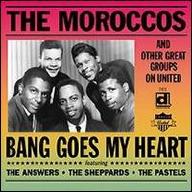The first session, in the fall of 1954, did not prove satisfactory. The group -- who were by then calling themselves the Four Chimes -- recorded "Easy Baby" and "When Was My Baby Born," the latter of which was a reworking of an old Negro religious folk song called "The Last Month of the Year." United decided to shelve the recordings and Allen and the group agreed that what they needed was -- not only a fifth member -- but also an additional lead.
The group recruited Sollie McElroy, formerly of the Flamingos (from nearby Douglas, a suburb of Chicago). McElroy had been the Flamingo's lead singer since 1952, but he was having problems in the group and wanted out. He was already in his twenties, while the remaining Four Chimes were still in their teens. Nevertheless, he fit in much better, and with McElroy as a member, the group went into session again in January 1955. One of the musicians in the studio had a set of maracas, which inspired the group to adopt the name, becoming the Moroccos. The first session yielded a dance tune, "Chicken," which became the Moroccos' first 45 release, which actually received some airplay, but failed to chart.
The next session, in May 1955, produced a McElroy-led version of the Harold Arlen tune "(Somewhere) Over the Rainbow." Released in October, this record was a double-sided hit in the Chicago area, but "Over the Rainbow" would land the group their first national attention. The Moroccos might have been able to exploit the single's popularity with live appearances; however -- after auditioning as "The Harlem Blackbirds" -- they had already signed a contract for an eight-week promotional tour of Australia with Larry Steele's Smart Affairs road show (the preeminent black entertainment organization presenting a variety of black acts in one package tour). Each member of the group made 150 dollars per week as a per diem on the Australian tour.
The Moroccos returned to Chicago in mid-February 1956 and high schooler Vernon (who was underage and unable to travel with them) rejoined the group for a Midwest tour, sharing bills along the way with the Coasters, the Flamingos, the Danderliers, and the Dells. They also backed Lilian Brooks on a session for King Records.
In late July, the Moroccos had one more lined up session with United, but shortly before the group was to go into the studio, Prayer Kemp joined the Marines. His replacement was Calvin Baron. The session ended up producing two releases for the Moroccos, including "What Is a Teenager's Prayer," later a hit for Joe Simon.
Unfortunately, United was incapable of promoting and pushing the Moroccos as the company was about to fold. The Moroccos did one more session, this one for Salem Records, but it too failed to attract an audience, and the group decided to split.
Vernon and Martin followed Kemp's lead and joined the Marines, while Morrow later joined the Army. Only McElroy and Baron immediately continued intermittently in the music business. In 1961, McElroy joined the Chaunteurs. Near the end of the 1950s, Calvin Baron joined the Cosmic Rays, a vocal group created and recorded by the avant-garde jazz artist Sun Ra.
In the late 1960s, Kemp and Morrow joined with the former El Dorados lead Pirkle Lee Moses to form the Major-Minors and put out an obscure record on the Scat label in Detroit. In 1970, when they recorded some tunes for Al Smith's Torrid label, Smith insisted on having their name changed to the recognizable El Dorados name. Shortly afterward the group broke up. Moses and Kemp were part of yet another El Dorados revival group during the '80s.
Around 1982, McElroy formed a new Moroccos group with original member Larry Johnson, Fred Martin, and former El Dorados member Richard Nickens. No recording career developed and infrequent gigs paid poorly, so when Fred Martin died in 1986, the group broke up. Johnson later joined a revived El Dorados group, but passed away in 1998. Morrow died in 1982, Kemp in 1992, and McElroy in 1995. ~ Bryan Thomas, Rovi












